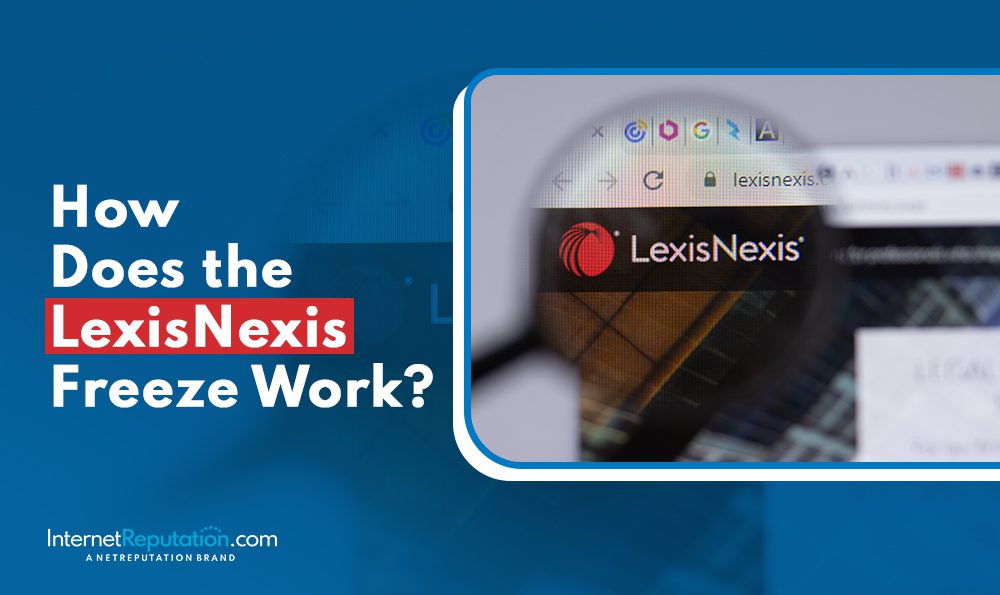Smart Background Checks Opt-Out Guide

This Smart Background Checks opt-out guide goes over the process of removing your information from the people search website.
Background checks have become increasingly popular in today’s digital age as a means to gather information about individuals. These checks compile data from various sources, including public records, social media, and online databases, to provide comprehensive and free background check reports. However, the presence of personal information on data broker websites poses privacy concerns and potential risks.
This Smart Background Checks removal request guide aims to help individuals understand the importance of opting out of SmartBackgroundChecks.com and similar data broker sites. We’ll also provide the step-by-step process to protect your personal details online. By following this guide, you can take control of your personal information and protect your privacy.
InternetReputation.com provides the information and services you need to protect your digital presence. Get started with a free online reputation analysis by calling 941-259-4554 today.
What Are Background Checks?

To navigate the world of employment and security screenings, you first need to understand what background checks are. Why would anyone want to find out private data about you?
These advanced checks use artificial intelligence and data analytics to gather information on individuals from various sources. They provide comprehensive insights into an individual’s criminal records, employment history, education, social media presence, public records and more. Background checks are designed to aid hiring decisions, mitigate risks, and ensure the safety and well-being of organizations and individuals.
Running background checks enables individuals and organizations to make informed decisions based on factual evidence. Whether it’s verifying credentials, assessing potential risks, or ensuring compliance, a background report can provide valuable insights. By embracing the power of technology and data analytics, background checks play a crucial role in creating safer and more secure environments.
What Is the Smart Background Checks Website?
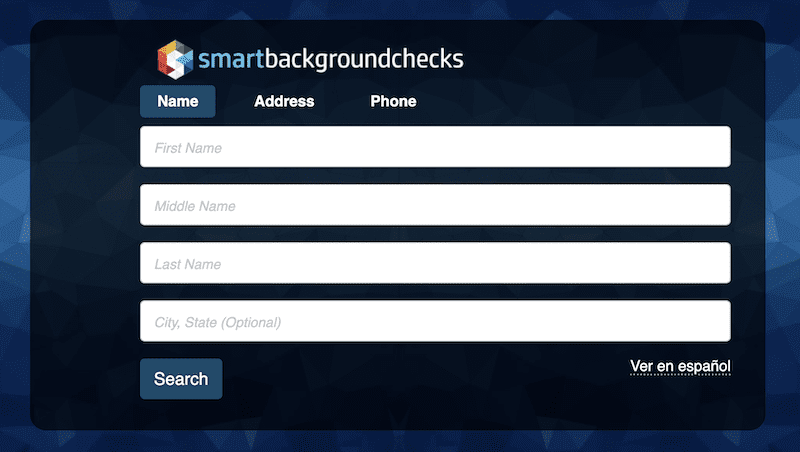
The Smart Background Checks website, which you can find at smartbackgroundchecks.com, is one of many data broker sites that let you look up private data and public records about individuals.
By entering a person’s name, address or phone number into Smart Background Checks, along with optional information to help narrow down results, you can find all sorts of details about the individual, such as:
- Age
- City and state
- Home address
- Phone numbers
- Relatives’ names
And that’s just what you’ll find on the initial search results page. By clicking to open the free background report, you’ll find even more details about the person.
Directly below their basic contact information is a map that lets you see exactly where they live.
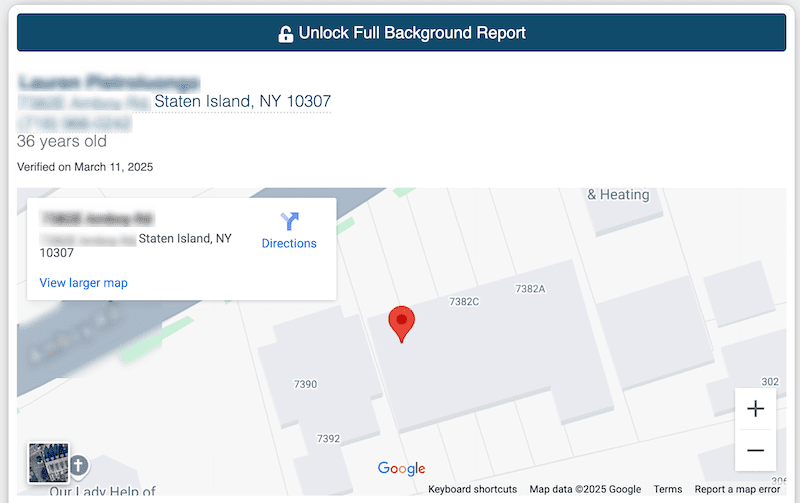
Underneath that, you’ll find detailed data about the person’s property, including its estimated value, how many bedrooms it has, the square footage, the school district, and more.
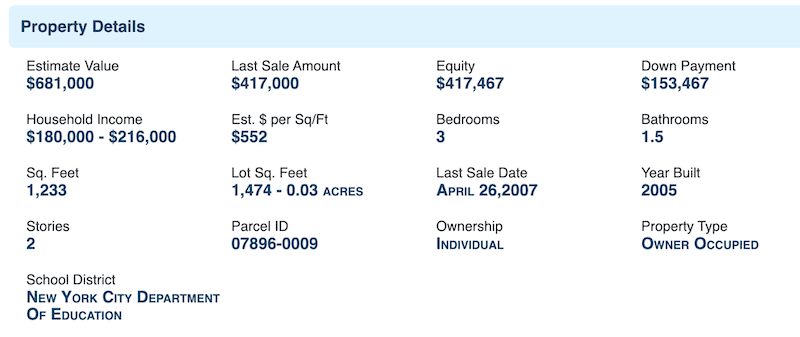
The free background report goes on to include the person’s phone numbers, age and birth year, relatives’ full names, and email addresses. There are also links to run a more complete background check to find social media profiles, warrants, court and traffic records, arrest records, and more.
Why Is Opting Out of Smart Background Checks Important?

Opting out of the Smart Background Checks website and other data broker sites is crucial for multiple reasons.
First and foremost, it safeguards your privacy and personal information, ensuring that it remains inaccessible without your consent. By leaving so much private data available for anyone to find, you put yourself at risk for everything from online harassment to identity theft.
Secondly, when you request removal, you take a step toward preventing potential discrimination that could arise from inaccurate or misleading data. By opting out of Smart Background Checks and similar people search sites, you are empowering yourself to have more control over your own personal data.
By actively choosing to opt out, you are taking proactive measures to protect your sensitive information and prevent its misuse. In the modern digital era, where data breaches and identity theft are widespread, it is essential to prioritize the safeguarding of your personal information.
In addition, opting out promotes fairness and equal opportunities. Background checks sometimes contain outdated or erroneous information, which can negatively impact your employment and housing prospects. By opting out, you ensure that decisions regarding your life are based on precise and current information.
We can help you create a positive online reputation, even if you’re starting from zero or rebounding from reputational damage. Call us at 941-259-4554 for more information.
Smart Background Checks Opt-Out Guide
Submitting a removal request to Smart Background Checks is simple. Here’s what to do:
1. Start on the homepage
Go to the Smart Background Checks homepage, which you can find here.
2. Find the “do not share” link
Scroll to the bottom of the homepage. Click the Do Not Sell or Share My Personal Information link.

3. Open the opt-out form
Scroll down to the How to Opt Out section. Next to “Online,” click the Opt-Out Form link.

4. Enter your email address and begin the process
In the white box, enter your email address. Click the “I agree” checkbox, as well as the “I’m not a robot” CAPTCHA. Then, click the Accept Terms and Start Removal button.
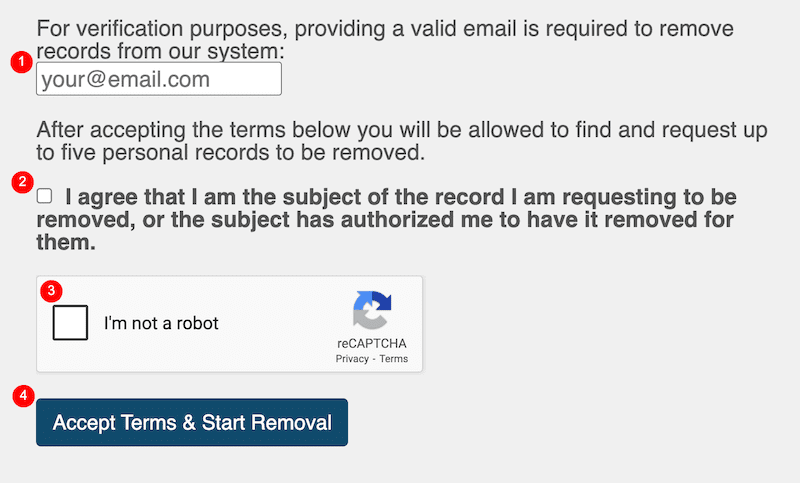
5. Go to the search features page
Click the Search Features link in the sentence that begins with “Please navigate.”

6. Conduct a people search
Enter your information in the search features box. Click Search when you’re ready.
7. Open the free background report
If your profile is among the search results, click the blue bar that says Open Free Background Report.
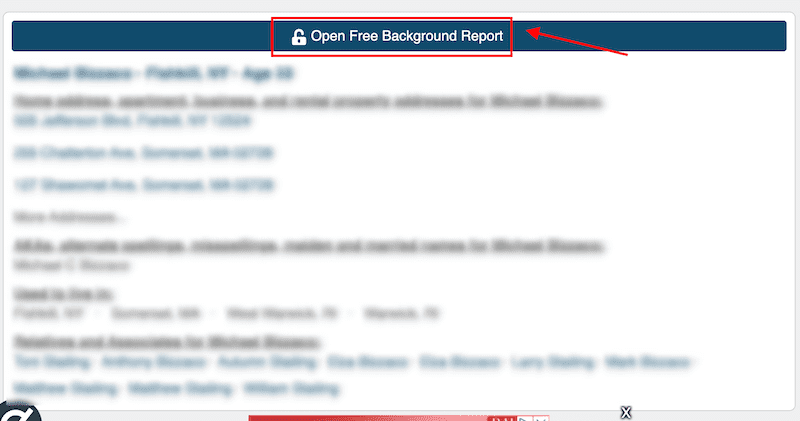
8. Click the removal request bar
Underneath the person’s name and basic contact information, click the blue bar that says Request My Record To Be Removed.
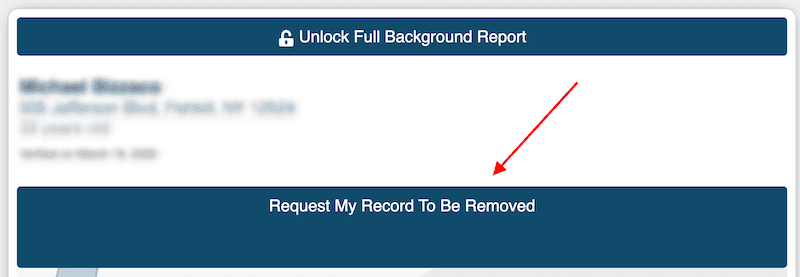
9. Check for the removal request confirmation email
Clicking that link should auto-trigger a removal request confirmation email to be sent to you. Check your inbox for the email. Click the blue removal button in the removal request confirmation email.
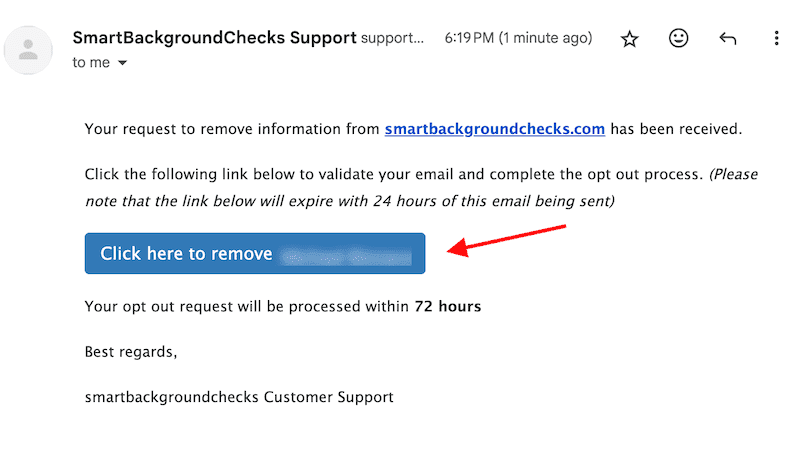
Make sure to not skip this step! Without clicking the link in the removal request confirmation email, the removal request will not be complete.
10. Wait for the removal request confirmation page
After a few seconds, you’ll be brought to the Smart Background Checks data removal confirmation page. The page will say that your removal request was submitted and that Smart Background Checks is processing it.
11. Use the people search features to check for your information
After about a month, head back to the Smart Background Checks people search website to see if the data removal has finished. If you can still find your public records listed on the site, submit another removal request.
How To Remove Your Public Records Info From Other Data Broker Sites

Once you’ve submitted a removal request with Smart Background Checks, you can move on to requesting data removal from other people search sites. Here’s how to do that.
1. Identify the Websites That Have Your Public Records
To identify the websites that have information from your public records, start by conducting an online search for background check websites.
Visit popular background check websites and people search sites such as Spokeo, BeenVerified, and Instant Checkmate. Search for your name, address and phone number on these sites, taking advantage of whatever search features are available.
It’s also smart to check for common misspellings of your name. It’s possible your information is on some people search sites but that your name is misspelled. Or, it’s also possible that your data is under your maiden name or another alternative name you no longer use.
2. Review the Opt-Out Process for Each People Search Website
When reviewing the opt-out process for sites like Smart Background Checks, keep these tips in mind:
- Seek out a dedicated opt-out or privacy section on the website.
- Carefully read the instructions provided in the opt-out section.
- Complete any necessary forms or provide the required information.
- Submit the fully filled opt-out request.
- Maintain a record of your opt-out request for future reference.
- Await confirmation or notification from the background check provider regarding the status of your opt-out request.
- If necessary, communicate with the provider if you do not receive a response within a reasonable time frame.
- Monitor your personal information online to ensure it is no longer accessible through the background check service provider.
Do you need to speak with an expert about reputation monitoring, management or repair? Get in touch with us by calling 941-259-4554 today.
3. Monitor Your Data Removal and Online Privacy
Deciding to request removal from data broker websites is only part of the process of monitoring your online presence. Here are some tips for online privacy and ensuring that any information online about you is accurate.
- Use a Listening Tool: It’s important to know whenever new information pops up about you online. Tools like Google Alerts make it easy to learn about every mention of your name online as it occurs.
- Verify Your Information: When it comes to data you won’t request removal for — like a positive article about you online — make sure your information is correct. If it’s not, correct discrepancies ASAP.
- Document All Communication: It is essential to keep a thorough record of all communication you have with data broker websites and other online sources. Save emails, phone calls, and any other interactions. This documentation can be valuable for legal and compliance purposes.
Our clients come to us when they need to build or repair their online reputation and take control of their digital presence. Call us at 941-259-4554 to learn more.
5 Additional Tips for Opting Out of Data Broker Sites

Here are 5 additional tips for opting out of sites like Smart Background Checks and other data brokers:
- Update your privacy settings on social media platforms to limit access to your personal information.
- Utilize privacy-focused search engines like DuckDuckGo or Startpage for online searches.
- Opt out of data broker websites that collect and sell personal data.
- Be cautious when sharing your personal information online, especially on public platforms.
- Regularly check and monitor your credit reports for any suspicious activity.
Are you worried that you’re being over-cautious when it comes to data removal and online privacy? You’re not.
In the U.S., almost 40% of internet users are worried about how companies use their personal data online. Additionally, more than 41% of internet users turn on ad blockers as a way to protect their privacy online, and almost 29% do so specifically to stop companies from collecting their personal data.
What Are the Limitations of Background Checks?

Background checks are a valuable tool, but it is important to understand and acknowledge the limitations associated with them. These limitations should be taken into consideration when using background checks as part of the decision-making process.
Accuracy
It is crucial to recognize that background checks depend on information gathered from various sources. While efforts are made to ensure accuracy, there is always a possibility of errors. This is something to keep in mind when interpreting the results of a background check.
Scope
Background checks can only provide information that is publicly available or obtained through authorized channels. It is essential to understand that they may not uncover concealed or undisclosed information about an individual. This limitation should be taken into account when relying on background checks for comprehensive insights.
Time Frame
Background checks offer a snapshot of an individual’s history at a specific point in time. However, it is important to remember that it may not reflect recent developments or changes in circumstances. Therefore, additional information and updates may be necessary to have a complete understanding of an individual’s background.
Legal Restrictions
It is critical to adhere to relevant laws and regulations when conducting background checks. These legal restrictions may prevent certain types of information from being included in the report, or there may be limits on accessing it. It is important to be aware of and respect these legal boundaries.
Privacy Concerns
Conducting background checks must be done in compliance with privacy laws and regulations. It is imperative to protect individuals’ privacy rights and only access necessary and relevant information. Respecting privacy concerns is crucial for maintaining ethical and lawful practices when utilizing background checks.
Understanding these potential limitations is paramount when using background checks. It allows for the proper management of expectations and ensures that the information obtained is used responsibly and lawfully.
What Are the Alternatives to Opting Out?

There are alternatives to opting out of Smart Background Checks that individuals can consider.
Limiting Your Personal Information Sharing
Be cautious about sharing personal information online and on social media platforms. By limiting the amount of personal information available on the internet, individuals can reduce the chances of their information appearing on background check websites.
Consider Your Privacy Settings
Adjusting privacy settings on social media platforms and other online accounts can help control who can access your personal information. By setting profiles to private or limiting the visibility of personal details, individuals can have more control over their online presence.
Use Alternative Email Addresses
When signing up for online services, consider using alternative email addresses that are not associated with personal or professional identities. This can help minimize the likelihood of personal information being linked to background check services.
Monitor Your Personal Information
Regularly checking for personal information on background check websites can help individuals stay aware of what information is available. If any incorrect or outdated information is found, steps can be taken to correct it.
Seek Legal Advice
Depending on the circumstances and your individual preferences, consulting with an attorney who specializes in privacy law can provide guidance on protecting your personal information and navigating the world of background checks.
By considering these alternatives, individuals can take steps to protect their online privacy and minimize the availability of personal information on background check websites.
FAQ About Smart Background Checks Opt-Outs

Can I completely remove my information from Smart Background Checks?
Yes, you have the ability to completely remove your information from Smart Background Checks. Smart Background Checks offers individuals the option to opt out and have their information expunged from their database.
To initiate the removal request process, you will need to access the Smart Background Checks website and locate their opt-out page. Once there, carefully follow the provided instructions to formally request the elimination of your data.
It is crucial to keep in mind that this procedure may require a certain amount of time, and there is a possibility that your information could still remain accessible on other public records sites or databases.
What are the risks of having your information on Smart Background Checks and other data brokers?
Having your information on smart background checks poses several risks.
First, it increases the chances of identity theft and fraud. Cybercriminals can access and misuse your personal data, such as your Social Security number, address, and financial details, to commit various fraudulent activities.
Second, having your information on Smart Background Checks can lead to reputational damage. If inaccurate or negative information about you is included in the background check report, it can negatively impact your personal and professional life. It may affect your chances of getting a job, a loan, or even housing.
Third, there is a risk of invasion of privacy. Smart Background Checks and similar sites often gather extensive information about individuals from various sources, including public records and social media. This can result in a comprehensive profile of your personal life being available to anyone who uses these services, compromising your privacy.
Lastly, being on Smart Background Checks can make you more vulnerable to targeted advertising, scams, and unwanted solicitations. For example, companies may use the gathered information from a tenant background check to tailor marketing campaigns, target vulnerable individuals, or send unsolicited communication.
To mitigate these risks, it is important to regularly monitor your information on Smart Background Checks, opt out whenever possible, and take steps to safeguard your personal information online. Being aware of the potential online privacy risks can help you make informed decisions and take necessary actions to protect yourself.
What are my legal rights when it comes to Smart Background Checks?
It is important to understand your rights and how they apply to background checks. These legal rights primarily revolve around privacy and fair use of personal information.
Firstly, individuals have the right to control and protect their own personal information. This means that companies conducting background checks must comply with data protection laws and obtain appropriate consent before accessing and using personal information.
Secondly, individuals have the right to know what information is being collected and how it is being used. Transparency is key when it comes to background checks, and companies must inform individuals about the purpose of the check, the sources of information, and any third parties with whom the information is shared.
Thirdly, individuals have the right to correct any inaccuracies in their background check reports, including on Smart Background Checks. If you believe that the information being reported is incorrect or outdated, you have the right to request a correction or removal of that information.
Lastly, individuals have the right to file a complaint or take legal action if their rights are violated. If you believe that a company like Smart Background Checks has unlawfully used your personal information or failed to comply with privacy laws, you can make complaints or seek legal recourse to protect your rights.
It is important to be aware of these legal rights and exercise them when necessary to ensure that your privacy and personal information are protected.
Can I opt out of other background check services?
You have the option to opt out of other background check services in addition to Smart Background Checks.
It’s important to remember that each background check service operates independently, so you will need to do your research and follow the specific opt-out process for each service you wish to opt out of.
Some background check services may have their own dedicated opt-out portals or processes, while others may require you to contact them directly via email, phone, or mail.
To ensure you follow the correct steps, it’s recommended that you carefully review the opt-out instructions provided by each background check service.
Furthermore, please keep in mind that opting out of one background check service does not automatically opt you out of all background check services. You will need to individually opt out of each service from which you want to remove your information.
It’s important to regularly review and monitor your information on different background check services to ensure that your opt-out requests are being effectively processed and that your privacy is being safeguarded.
By following the appropriate opt-out procedures for each background check service, you can take control of your personal information and protect your privacy.
What should I do if my opt-out request is denied?
If your opt-out request is denied, there are several steps you can take to address the issue and protect your privacy.
1. Review the Reasons for Denial: Carefully read the explanation provided for the denial of your opt-out request. Understand the specific grounds on which it was rejected.
2. Contact the Background Check Provider: Reach out to the background check company and inquire about the reasons for the denial. Seek clarification and gather any additional information they may require to process your request.
3. Provide Supporting Documentation: If your opt-out request was denied due to incomplete or inaccurate information, gather the necessary documents to support your claim. This could include identification documents, court records, or any other relevant evidence.
4. Escalate the Issue: If you are unable to resolve the matter directly with the background check provider, consider escalating the issue to a higher level of authority within the company or filing a complaint with the appropriate regulatory agency.
5. Seek Legal Assistance: In some cases, it may be necessary to seek legal advice to address the denial of your opt-out request. Consult with an attorney who specializes in privacy and consumer rights to explore your legal options.
Remember, each situation may have different circumstances and requirements. It is important to follow the specific instructions and procedures outlined by the background check provider to increase the chances of a successful opt-out request.
Can I opt out of Smart Background Checks for others?
Yes, you have the ability to opt out of Smart Background Checks for others. Follow the same steps as you would for opting out of your own background checks. Of course, make sure that you have permission from the individual to submit an opt-out request on their behalf.
How long does it take for the opt-out process to complete?
While there is no set timeframe, it typically takes a few weeks for the Smart Background Checks opt-out request to be processed and for your information to be removed from the website. After submitting your opt-out request, it is important to monitor and follow up on the progress.
Should I regularly check for my information on Smart Background Checks?
When it comes to Smart Background Checks, it is important to regularly check for your information to protect your privacy. Here are the benefits of occasionally checking for your data on Smart Background Checks and other sites that you’ve gone through the data removal process for:
- Identity Theft Prevention: Regularly checking for your information on Smart Background Checks can help you identify any unauthorized access or fraudulent activities associated with your personal data.
- Accuracy: By checking your information regularly, you can ensure that the data being collected and displayed by Smart Background Checks is correct. Mistakes or inaccuracies in your personal information can have serious consequences.
- Opportunity to Address Errors: If you find any inaccuracies or outdated information, you can take the necessary steps to correct them. This may involve contacting the relevant authorities or organizations to update your information.
- Monitoring Your Personal Reputation: By regularly checking for your information online, you can stay informed about what others might find when conducting background checks about you. This allows you to manage and protect your personal reputation.
Does opting out of Smart Background Checks protect my privacy?
Opting out of Smart Background Checks protects your privacy in certain ways:
- Opting out can reduce the amount of personal information available online about you. By removing your information from background check websites, you can limit the potential for your data to be accessed by individuals or organizations without your consent.
- It can prevent your personal information from being used for malicious purposes. When your information is listed on background check websites, it can be easily accessed by anyone, including identity thieves and scammers. Opting out can decrease the risk of your information being misused.
- Opting out allows you to maintain better control over your own data. By removing your information from background check websites, you are asserting your right to privacy and taking steps to protect your personal information from being easily accessible to others.
- While opting out cannot completely erase your digital footprint, it can significantly reduce the amount of information available about you online. This can make it more difficult for individuals or organizations to gather detailed personal information about you without your knowledge or consent.
- By opting out, you are actively taking measures to protect your privacy and safeguard your personal information from potential threats and vulnerabilities. It is an important step in maintaining control over your digital presence and minimizing the risks associated with unauthorized access to your personal data.
We Can Help With Data Removal and Online Privacy
At InternetReputation.com, we provide online reputation management information to individuals and businesses who want to create, grow or repair their digital presence. Whether you’re prioritizing your personal or professional online reputation, our advice, services and team of experts can help.
We offer a range of ORM services, including content removal, online review management, and reputation repair following a crisis. Our five-step process includes analysis, web property development, content creation, publishing and promotion.
Call us today at 941-259-4554 to speak with a data removal expert.

